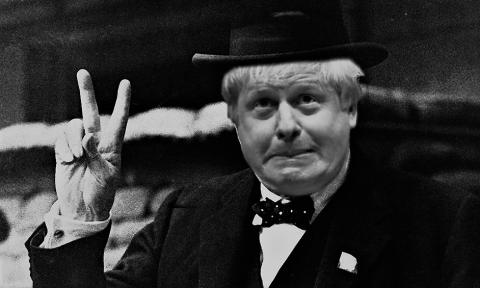Submitted by ICConline on
In his long political career Winston Churchill epitomised the implacable defence of British imperialism’s best interests, and for this reason he is still an icon for all factions of the British bourgeoisie, who have now recruited him in support of their arguments over Brexit.[1]
In 1953 Churchill apparently told the House of Commons: “If Britain must choose between Europe and the open sea, she must always choose the open sea.” For the Brexiteers this is clear proof that Churchill was a convinced Eurosceptic. Except, as supporters of remaining in the EU have pointed out, he didn’t say this to Parliament at all; the quote is concocted. For the Remainers, on the contrary, Churchill was a passionate believer in a ‘United States of Europe’.
In fact what Churchill said on the question of Britain and Europe is revealing not only of the delusions of British imperialist policy after World War 2, but also of the extent to which Brexit is a mistake for the British bourgeoisie.
In Churchill’s vision of the post-WW2 world, Britain as a global imperialist power held a unique position at the centre of the Empire and Commonwealth, the ‘English-speaking world’ (ie. the USA) and a future United Europe; the interests of British imperialism were best served by maintaining close relationships with all three. For Churchill, Britain was therefore “with” Europe, but not “of” it.
The trouble was, Britain’s status as a global imperialist power was already in irreversible decline.
Before WW2 the British ruling class had tried hard to appease Hitler’s imperialist appetites, precisely because it knew that in a major war it risked losing its global empire and becoming a dependency of Germany – or America. But in the end of course it went to war to defeat its continental rival with American help, and despite all of Churchill’s best efforts and the famed ruthlessness of the British bourgeoisie that Hitler so admired, it came out of the war bankrupted by its supposed ally, and having lost its empire to the new global superpower.
Churchill’s post-war vision of Britain’s role was therefore a last ditch attempt to hold onto Britain’s status as an independent imperialist power. But the humiliation of British and French imperialism at Suez in 1956[2] demonstrated US supremacy and forced Britain to accept its subordinate role within the US bloc. This eventually led the main factions of the British bourgeoisie to conclude that Britain’s interests were best served by being part of Europe. There were clear advantages to the British economy in greater integration, with the removal of internal tariffs, etc., but there was also a strategic reason. Churchill had supported the idea of a ‘United States of Europe’ not, as the ‘Remainers’ would like, in the interests of ‘peace and prosperity’, but as a way of neutralising the threat from Britain’s continental rivals, as well as providing a much-needed counterweight to overweening American power.
Britain’s real objective in joining the EEC in 1973 is nicely summarised in the clip from the “Yes Minister” comedy series on the ICC homepage: to divide and rule. It did not give up the pretensions that lay behind Churchill’s vision – the pretensions of a former global maritime imperialist power resentful of the subordination of its interests to the “Brussels bureaucracy” – and continued to consider itself to be “with” Europe, but not “of” it.
But outside of the EU and unable to directly influence its decision-making, Britain will find it more difficult to pursue this strategy, while for the same reason it risks being of even less use to the US as an ally – even without the added volatility of the Trump regime and its ‘America First’ policy. This is why Brexit is fundamentally a mistake for the interests of British imperialism, the result not of a re-orientation of imperialist policy but of the rise of populism and growing political instability.
The rosy vision of the Brexiteers – of Britain as a great island trading nation in the swashbuckling spirit of the 19th century when it ruled the waves – is even less based on the realities of British economic and political power than in Churchill’s era. The limitations on British imperialism’s pretensions to ‘punch above its weight’ are best illustrated by the ongoing fiasco of its new aircraft carrier, which is not only leaking water but more importantly will have to wait until 2023 for all its much-delayed US-built fighter jets; two years after it is supposed to be operational, making it reliant on the US Marine Corps to provide its air power. Continuing defence cuts mean that the second carrier may never be completed while operating the new warships could exceed Britain’s total future defence spending. Meanwhile, as the right-wing Telegraph spluttered, the same cuts could leave the army the smallest it’s been since Britain lost its American colonies... More than that, in a major operation British imperialism would have to deploy its remaining ground forces as part of larger US-led units.
How’s that for symbolism?
MH January 2018







 del.icio.us
del.icio.us Digg
Digg Newskicks
Newskicks Ping This!
Ping This! Favorite on Technorati
Favorite on Technorati Blinklist
Blinklist Furl
Furl Mister Wong
Mister Wong Mixx
Mixx Newsvine
Newsvine StumbleUpon
StumbleUpon Viadeo
Viadeo Icerocket
Icerocket Yahoo
Yahoo identi.ca
identi.ca Google+
Google+ Reddit
Reddit SlashDot
SlashDot Twitter
Twitter Box
Box Diigo
Diigo Facebook
Facebook Google
Google LinkedIn
LinkedIn MySpace
MySpace